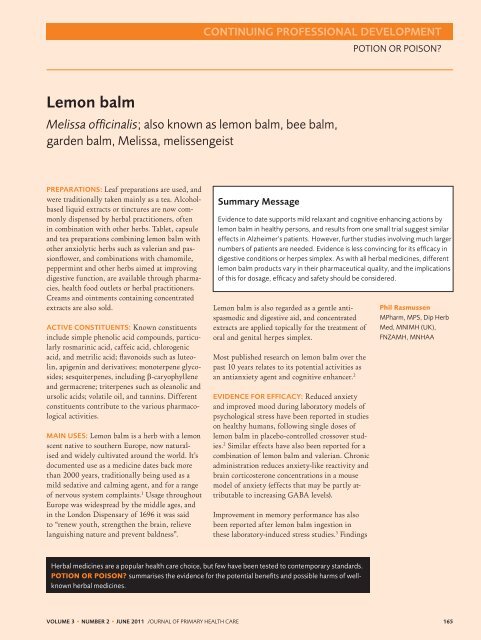single PDF of the entire issue - The Royal New Zealand College of ...
single PDF of the entire issue - The Royal New Zealand College of ...
single PDF of the entire issue - The Royal New Zealand College of ...
You also want an ePaper? Increase the reach of your titles
YUMPU automatically turns print PDFs into web optimized ePapers that Google loves.
continuing pr<strong>of</strong>essional development<br />
POTION OR POISON<br />
Lemon balm<br />
Melissa <strong>of</strong>ficinalis; also known as lemon balm, bee balm,<br />
garden balm, Melissa, melissengeist<br />
Preparations: Leaf preparations are used, and<br />
were traditionally taken mainly as a tea. Alcoholbased<br />
liquid extracts or tinctures are now commonly<br />
dispensed by herbal practitioners, <strong>of</strong>ten<br />
in combination with o<strong>the</strong>r herbs. Tablet, capsule<br />
and tea preparations combining lemon balm with<br />
o<strong>the</strong>r anxiolytic herbs such as valerian and passionflower,<br />
and combinations with chamomile,<br />
peppermint and o<strong>the</strong>r herbs aimed at improving<br />
digestive function, are available through pharmacies,<br />
health food outlets or herbal practitioners.<br />
Creams and ointments containing concentrated<br />
extracts are also sold.<br />
Active constituents: Known constituents<br />
include simple phenolic acid compounds, particularly<br />
rosmarinic acid, caffeic acid, chlorogenic<br />
acid, and metrilic acid; flavonoids such as luteolin,<br />
apigenin and derivatives; monoterpene glycosides;<br />
sesquiterpenes, including β-caryophyllene<br />
and germacrene; triterpenes such as oleanolic and<br />
ursolic acids; volatile oil, and tannins. Different<br />
constituents contribute to <strong>the</strong> various pharmacological<br />
activities.<br />
Main uses: Lemon balm is a herb with a lemon<br />
scent native to sou<strong>the</strong>rn Europe, now naturalised<br />
and widely cultivated around <strong>the</strong> world. It’s<br />
documented use as a medicine dates back more<br />
than 2000 years, traditionally being used as a<br />
mild sedative and calming agent, and for a range<br />
<strong>of</strong> nervous system complaints. 1 Usage throughout<br />
Europe was widespread by <strong>the</strong> middle ages, and<br />
in <strong>the</strong> London Dispensary <strong>of</strong> 1696 it was said<br />
to “renew youth, streng<strong>the</strong>n <strong>the</strong> brain, relieve<br />
languishing nature and prevent baldness”.<br />
Summary Message<br />
Evidence to date supports mild relaxant and cognitive enhancing actions by<br />
lemon balm in healthy persons, and results from one small trial suggest similar<br />
effects in Alzheimer’s patients. However, fur<strong>the</strong>r studies involving much larger<br />
numbers <strong>of</strong> patients are needed. Evidence is less convincing for its efficacy in<br />
digestive conditions or herpes simplex. As with all herbal medicines, different<br />
lemon balm products vary in <strong>the</strong>ir pharmaceutical quality, and <strong>the</strong> implications<br />
<strong>of</strong> this for dosage, efficacy and safety should be considered.<br />
Lemon balm is also regarded as a gentle antispasmodic<br />
and digestive aid, and concentrated<br />
extracts are applied topically for <strong>the</strong> treatment <strong>of</strong><br />
oral and genital herpes simplex.<br />
Most published research on lemon balm over <strong>the</strong><br />
past 10 years relates to its potential activities as<br />
an antianxiety agent and cognitive enhancer. 2<br />
Evidence for efficacy: Reduced anxiety<br />
and improved mood during laboratory models <strong>of</strong><br />
psychological stress have been reported in studies<br />
on healthy humans, following <strong>single</strong> doses <strong>of</strong><br />
lemon balm in placebo-controlled crossover studies.<br />
2 Similar effects have also been reported for a<br />
combination <strong>of</strong> lemon balm and valerian. Chronic<br />
administration reduces anxiety-like reactivity and<br />
brain corticosterone concentrations in a mouse<br />
model <strong>of</strong> anxiety (effects that may be partly attributable<br />
to increasing GABA levels).<br />
Improvement in memory performance has also<br />
been reported after lemon balm ingestion in<br />
<strong>the</strong>se laboratory-induced stress studies. 3 Findings<br />
Phil Rasmussen<br />
MPharm, MPS, Dip Herb<br />
Med, MNIMH (UK),<br />
FNZAMH, MNHAA<br />
Herbal medicines are a popular health care choice, but few have been tested to contemporary standards.<br />
POTION OR POISON summarises <strong>the</strong> evidence for <strong>the</strong> potential benefits and possible harms <strong>of</strong> wellknown<br />
herbal medicines.<br />
VOLUME 3 • NUMBER 2 • JUNE 2011 J OURNAL OF PRIMARY HEALTH CARE 165

















